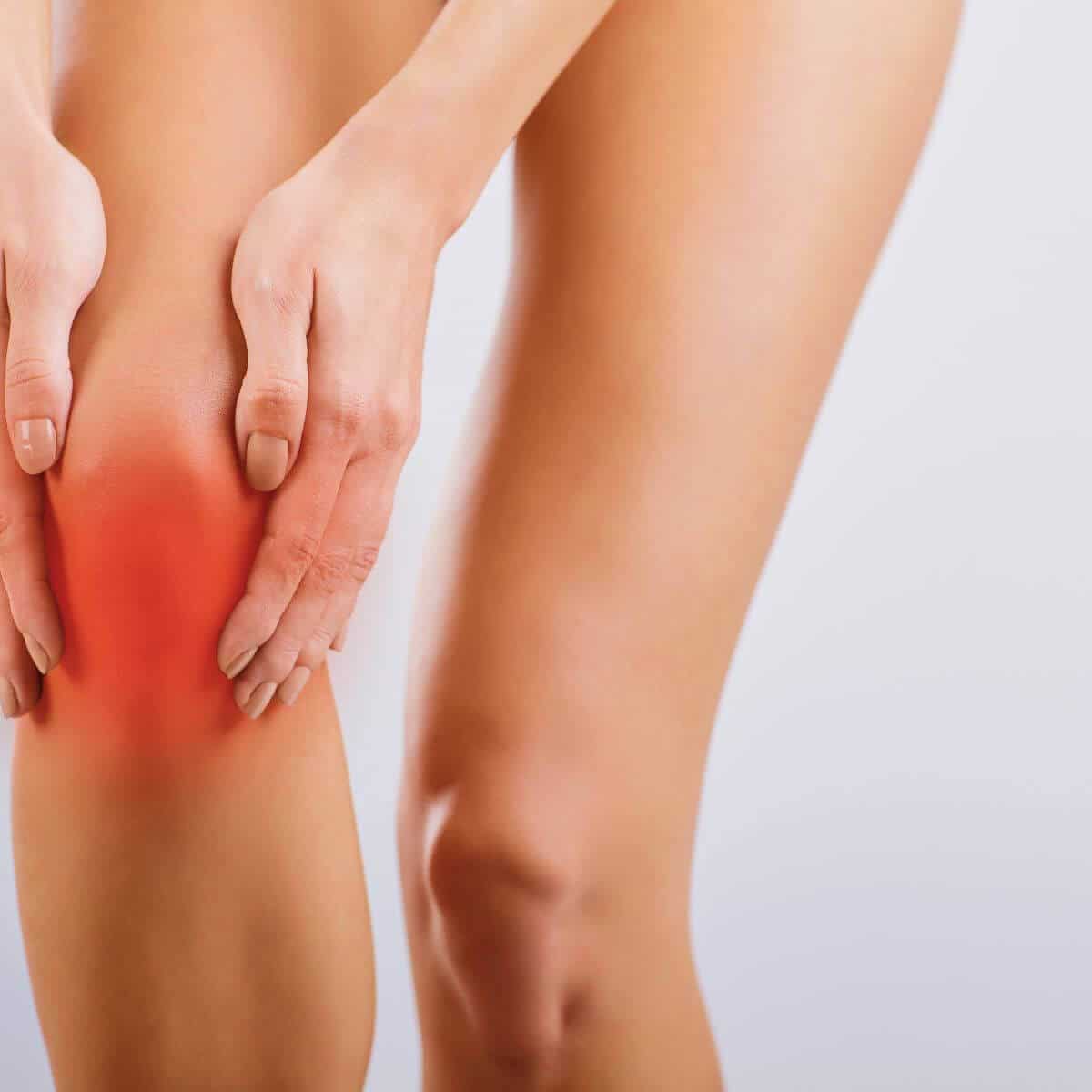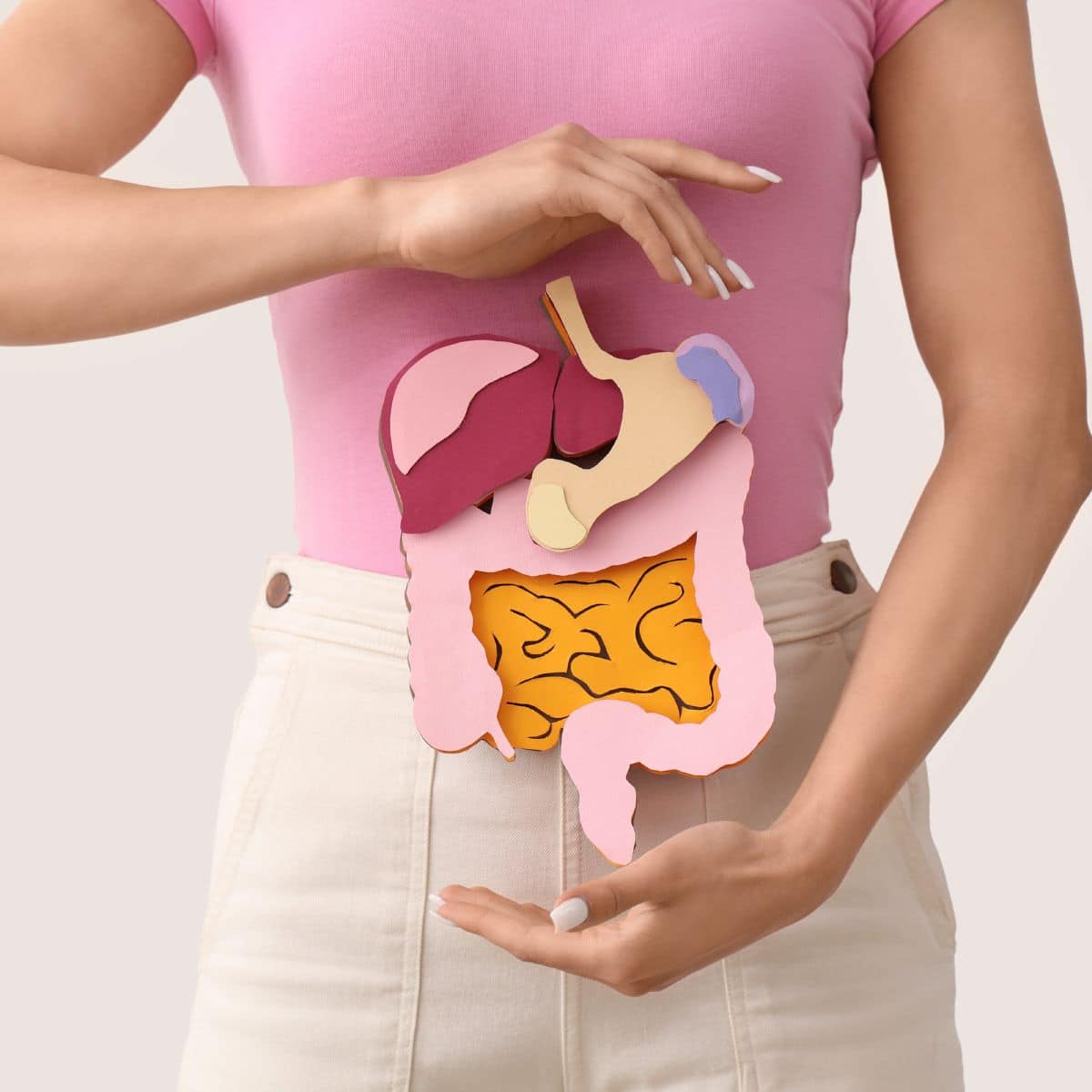Let’s talk natural supplements for a minute. As a holistic nutritionist, I am often asked for my best recommendations when it comes to natural supplements, especially for those suffering with chronic inflammation and pain. Some of the best supplements that help reduce inflammation and swelling might actually surprise you, because you might have already heard of a few. Let’s get into this hot health topic.

It’s no secret that inflammation-related health issues are on the rise. From chronic conditions like arthritis, leaky gut, and autoimmune diseases, to everyday discomforts, such as joint pain and digestive issues, many of us are grappling with the effects of inflammation in one form or another.
In fact, it’s estimated that as many as 35% of adults in America suffer from chronic inflammation.
However, there is some good news though – a growing body of evidence suggests that many natural remedies can effectively address inflammation without the side effects often associated with conventional medications.
In this article, I explore the importance of natural supplements in managing inflammation and provide valuable insights into some of the most effective options available.
Whether you’re seeking relief from chronic pain or simply looking to optimize your overall health, this guide aims to equip you with the knowledge and tools needed to make informed decisions about incorporating natural supplements into your wellness routine.

Understanding Inflammation
Inflammation, at its core, is the body’s natural response to injury, infection, or irritation. It’s a complex biological process that involves the immune system’s efforts to protect and heal damaged tissues.
When you sprain your ankle, for instance, inflammation sets in as your body rushes immune cells and healing factors to the site of injury, triggering symptoms like swelling, redness, warmth, and pain. This acute inflammatory response is crucial for initiating the healing process and preventing further damage.
However, inflammation isn’t always a short-lived event. In some cases, it can become chronic, lingering long after the initial threat has subsided. Chronic inflammation is characterized by persistent activation of the immune system, leading to sustained tissue damage and systemic effects throughout the body.
Unlike acute inflammation, which is a temporary and localized response, chronic inflammation can wreak havoc on multiple organ systems and contribute to the development of various diseases.
Common causes of chronic inflammation are multifaceted, often stemming from genetic predisposition, environmental factors, and lifestyle choices. Diet plays a significant role, with processed foods, sugary snacks, and unhealthy fats fueling inflammation by promoting oxidative stress and disrupting the balance of gut bacteria.
Sedentary lifestyles, exposure to environmental toxins, chronic stress, and inadequate sleep further exacerbate inflammation, creating a vicious cycle of immune dysregulation and tissue damage.
So, understanding the nuances of inflammation and its root causes is key to effectively managing and mitigating its impact on our health. In addition, by addressing these underlying factors and adopting strategies to reduce inflammation naturally, we can take proactive steps toward achieving true health.


Science of Bioactive Lipid Compounds in Fighting Inflammation
Bioactive compounds are naturally occurring chemical compounds found in plants. Among these, flavonoids, polyphenols, and saponins are particularly notable for their roles in combating inflammation.
💛 Flavonoids
Flavonoids are a diverse group of phytonutrients (plant chemicals) found in almost all fruits and vegetables. They are divided into several subgroups. Examples include the following.
❇️ Quercetin: Found in onions, apples, and berries.
🍵 Catechins: Found in green tea.
❇️ Anthocyanins: Found in berries and red grapes
Flavonoids reduce inflammation by combating harmful free radicals, boosting antioxidant enzymes, and inhibiting enzymes like COX and LOX that create inflammatory substances.
💙 Polyphenols
Polyphenols are a class of compounds characterized by the presence of multiple phenol units. They can be divided into several categories, including phenolic acids, stilbenes, and lignans. Examples include the following.
❇️ Resveratrol: Found in red wine, grapes, and peanuts.
🧡 Curcumin: Found in turmeric.
❇️ Epigallocatechin gallate (EGCG): Found in green tea.
Polyphenols, like flavonoids, fight free radicals and boost the body’s antioxidants. They also block the production of inflammatory cytokines like TNF-α and IL-6.
💜 Saponins
Saponins are glycosides with a distinctive foaming characteristic. They consist of sapogenin (the aglycone part) linked to one or more sugar chains. Examples include the following.
❇️ Ginsenosides: Found in ginseng.
🫚 Glycyrrhizin: Found in licorice root.
❇️ Diosgenin: Found in fenugreek.
Saponins reduce inflammation by inhibiting pro-inflammatory cytokines and lowering COX-2 expression. They enhance the immune system by boosting natural killer (NK) cells and macrophages.
🔑 These bioactive compounds often work synergistically, meaning their combined effects can be greater than the sum of their individual effects. For this reason, I’d highly recommend incorporating various fruits, vegetables, legumes, nuts, and teas into your diet, which can help ensure a good intake of these compounds!
Also, if an individual’s daily diet consists of many processed and fast foods, it can be a good option to look into natural supplements to help reduce swelling, inflammation, and pain. However, the best option is to focus on a nourishing diet with lots of anti-inflammatory foods.


Top Natural Supplements for Inflammation
When it comes to managing inflammation naturally, various supplements have shown promise in reducing symptoms and supporting overall health. Here are some of the top natural supplements known for their anti-inflammatory properties.
Quercetin
Quercetin acts as an anti-inflammatory and antioxidant. It’s abundant in foods like apples, onions, berries, and leafy greens.
Recommended dosage and tips for use: Supplements typically provide 500-1000 mg of quercetin per day.
Green Tea Extract
Green tea extract contains epigallocatechin gallate (EGCG), a powerful anti-inflammatory compound that modulates immune responses.
Also, green tea natural extract supplements help reduce pain, swelling, and inflammation by providing a rich source of antioxidants and anti-inflammatory compounds. These supplements are derived from the leaves of the Camellia sinensis plant, known for its numerous health benefits.
So, by incorporating green tea extract into your daily regimen, you may experience improved joint health, reduced muscle soreness, and an overall enhancement in your body’s ability to manage inflammatory responses. Additionally, green tea extract can support cardiovascular health and boost metabolic functions.
Recommended dosage and tips for use: 250-500 mg of green tea extract per day, standardized to contain at least 50% EGCG.
Turmeric (Curcumin)
Curcumin, the active compound in turmeric, inhibits inflammatory molecules such as NF-kB, reducing inflammation at the molecular level.
📥 GET THIS ARTICLE IN YOUR INBOX 📥
Recommended dosage and tips for use: Typically, 500-1000 mg of curcumin supplements daily. Look for supplements containing black pepper extract (piperine) to enhance absorption.

Resveratrol
Found in red wine, grapes, berries, and supplements, resveratrol exhibits anti-inflammatory effects and supports cardiovascular health.
Recommended dosage and tips for use: Dosage can vary, but typical supplements range from 250-500 mg of trans-resveratrol per day. My favorite brand of resveratrol comes in the partiQlar Longevity Starter Bundle. Use my code: EYN15 for 15% off your first order.
Ginger
Ginger contains bioactive compounds like gingerol and shogaol, which have been shown to reduce inflammatory markers.
Recommended dosage and tips for use: Consuming 1-2 grams of ginger per day, either through fresh ginger root supplements, or ginger tea, can provide anti-inflammatory benefits.
Omega-3 Fatty Acids
Omega 3s are known to reduce inflammation and support heart health. You can find them in fatty fish like salmon and mackerel, as well as plant-based sources such as flaxseed oil, chia seeds, and walnuts.
Recommended dosage and tips for use: Aim for 1000-2000 mg of EPA and DHA combined per day from fish oil supplements. For vegetarians and vegans, consider algae-based omega-3 supplements.
Boswellia (Frankincense)
Boswellia contains boswellic acids, which inhibit inflammatory enzymes like 5-lipoxygenase (5-LOX).
Recommended dosage and tips for use: Typical dosage ranges from 300-500 mg of boswellia extract, taken 1-3 times daily.
Probiotics
Probiotics promote the growth of beneficial bacteria in the gut, which play a key role in regulating the immune system.
Recommended strains and dosage: Look for supplements containing Lactobacillus acidophilus, Bifidobacterium lactis, and other well-researched strains. Dosage varies depending on the specific strains and formulation. My personal favorite brand is Seed DS-01™ Daily Synbiotic. You can receive 15% off your first order with my discount code: EYN15.
These natural supplements offer a holistic approach to managing inflammation and promoting overall health. However, it’s essential to consult with a healthcare professional before adding any new supplements to your regimen, especially if you have underlying health conditions or are taking medications.

Integrating Supplements into Your Daily Routine to Reduce Inflammation
Also, once you’ve identified the natural supplements that best suit your needs, the next step is to seamlessly integrate them into your daily routine. Here are some tips for incorporating supplements that effectively reduce pain, swelling, and inflammation.
Creating a Supplement Schedule
- Establish a consistent routine: Take your supplements simultaneously each day to develop a habit.
- Use reminders: Set alarms on your phone or leave notes in visible places to remind yourself to take your supplements.
- Consider mealtime: Some supplements are best taken with food to enhance absorption, so incorporate them into your meals if possible.
- Organize your supplements: Use pill organizers or containers to keep track of your daily doses and prevent missed doses.
Complementing with a Healthy Lifestyle
- Emphasize the importance of a balanced diet: While supplements can be beneficial, they should complement, not replace, a healthy diet rich in whole foods.
- Incorporate regular exercise: Physical activity can help reduce inflammation and improve overall health. Aim for at least 30 minutes of moderate exercise most days of the week.
- Practice stress management techniques: Chronic stress can exacerbate inflammation, so prioritize activities that help you relax and unwind, such as meditation, yoga, or spending time in nature.
Monitoring and Adjusting
- Track Your Progress – Keep a journal to record any changes in your symptoms or overall well-being since starting the supplements. Take note of how the supplements impact your pain, swelling, and inflammation.
- Stay Informed – Stay up-to-date on the latest research and consult with a healthcare professional if you have any concerns or questions about your supplement regimen.
- Be Flexible – Your body’s needs may change over time, so be prepared to adjust your supplement regimen accordingly based on your evolving health goals and circumstances.
Incorporate these strategies into your daily routine to maximize the effectiveness of your supplements and support your body’s natural ability to reduce inflammation, pain, and swelling. Remember consistency is key, and patience goes a long way as you work towards achieving your health goals.

Holistic Wellness Approaches to Reduce Inflammation
Inflammation can have a significant impact on our health and well-being, but the good news is that natural supplements offer a promising avenue for effectively managing inflammation, which ultimately will help reduce swelling and pain.
As you continue on your journey towards better health, remember that natural supplements are just one piece of the puzzle. Embracing a holistic approach to wellness, which includes a balanced diet, regular exercise, stress management, and adequate sleep, is key to optimal health and vitality.
So, by making mindful choices about what you eat, you can take a proactive approach to managing inflammation and improving your quality of life.
If you’re ready to take the next step and need guidance on your journey to better health, check out my additional resources below. Let’s work together to create a plan that fits your lifestyle and helps you achieve your wellness goals.
Let’s Discuss My Favorite Natural Supplements to Help Reduce Inflammation
So, have you tried any of these natural supplements that help reduce swelling and inflammation before? Let me know your personal experience below.
You can also connect with me @EatYourNutrition on Instagram. I love seeing your photos. #EatYourNutrition #LauraVillanueva

Additional Resources
Also, for further reading and guidance on how to help reduce pain, swelling, and inflammation through proper nourishment and natural supplements, check out some of my resources below.
Suspect you have an autoimmune disease and want to take the first steps to improve your health? Download my guide, Autoimmune Diet Roadmap to Healthy Eating.
– Program – Join my Reset & Renew Nutrition Program. Register here to learn about transforming your metabolism, mindset, and live in a healthy state of well-being. A 4-month online program will help reset and transform your entire body.
– Meal Plan – Want a simple recipe guide and anti-inflammatory meal plan packed with the key to reducing inflammation? Try this meal plan and recipes inside the Anti-Inflammatory Meal Plan.
– Group Support – Join my Featured Nutrition Challenge. All seasonal nutrition challenges come with a meal plan, recipe guide, grocery shopping list, and a seasonal featured nutrition theme.
📚 References
- Dehzad MJ, Ghalandari H, Nouri M, Askarpour M. Antioxidant and anti-inflammatory effects of curcumin/turmeric supplementation in adults: A GRADE-assessed systematic review and dose-response meta-analysis of randomized controlled trials. Cytokine. 2023 Apr;164:156144. doi: 10.1016/j.cyto.2023.156144. Epub 2023 Feb 15. PMID: 36804260.
- Mori TA, Beilin LJ. Omega-3 fatty acids and inflammation. Curr Atheroscler Rep. 2004 Nov;6(6):461-7. doi: 10.1007/s11883-004-0087-5. PMID: 15485592.
- Ballester P, Cerdá B, Arcusa R, Marhuenda J, Yamedjeu K, Zafrilla P. Effect of Ginger on Inflammatory Diseases. Molecules. 2022 Oct 25;27(21):7223. doi: 10.3390/molecules27217223. PMID: 36364048; PMCID: PMC9654013.
- Al-Yasiry AR, Kiczorowska B. Frankincense–therapeutic properties. Postepy Hig Med Dosw (Online). 2016 Jan 4;70:380-91. doi: 10.5604/17322693.1200553. PMID: 27117114.
- Ohishi T, Goto S, Monira P, Isemura M, Nakamura Y. Anti-inflammatory Action of Green Tea. Antiinflamm Antiallergy Agents Med Chem. 2016;15(2):74-90. doi: 10.2174/1871523015666160915154443. PMID: 27634207.
- Inoue H, Nakata R. Resveratrol Targets in Inflammation. Endocr Metab Immune Disord Drug Targets. 2015;15(3):186-95. doi: 10.2174/1871530315666150316120316. PMID: 25772176.
- Li Y, Yao J, Han C, Yang J, Chaudhry MT, Wang S, Liu H, Yin Y. Quercetin, Inflammation and Immunity. Nutrients. 2016 Mar 15;8(3):167. doi: 10.3390/nu8030167. PMID: 26999194; PMCID: PMC4808895.
- Milajerdi A, Mousavi SM, Sadeghi A, Salari-Moghaddam A, Parohan M, Larijani B, Esmaillzadeh A. The effect of probiotics on inflammatory biomarkers: a meta-analysis of randomized clinical trials. Eur J Nutr. 2020 Mar;59(2):633-649. doi: 10.1007/s00394-019-01931-8. Epub 2019 Mar 11. PMID: 30854594.
This post is not sponsored, but I am an affiliate partner. This means I will make a small commission if you buy through those links (I’ll earn some coffee money ☕ which I promise to drink while creating content that you will enjoy). (The prices are NOT marked up to pay me) and helps us run this website. I only recommend products that I trust and absolutely love!
Discover more from Eat Your Nutrition™
Subscribe to get the latest posts sent to your email.










